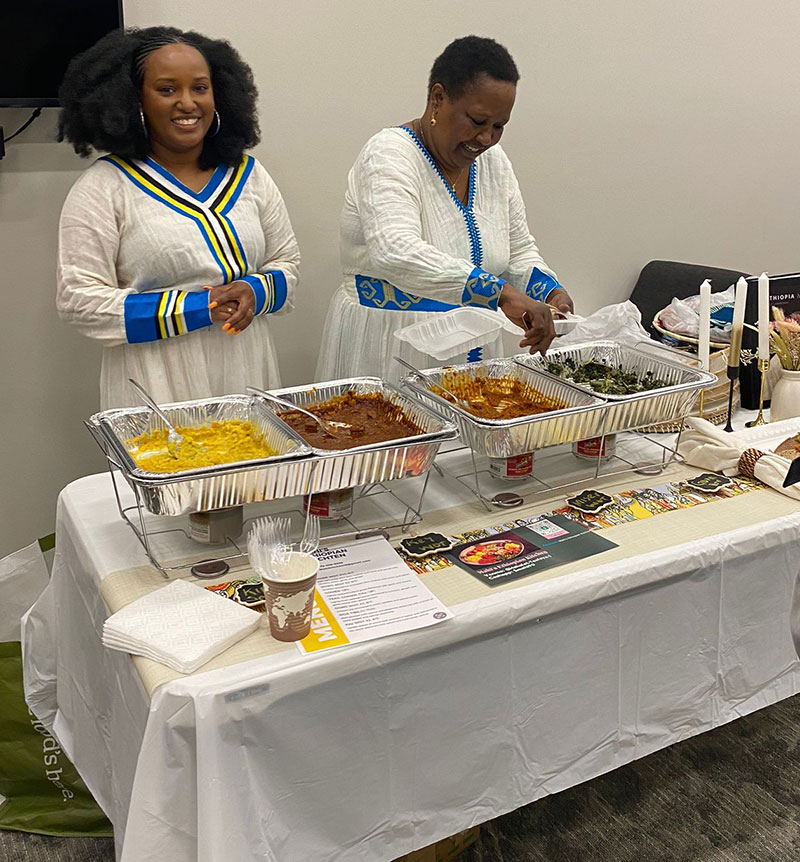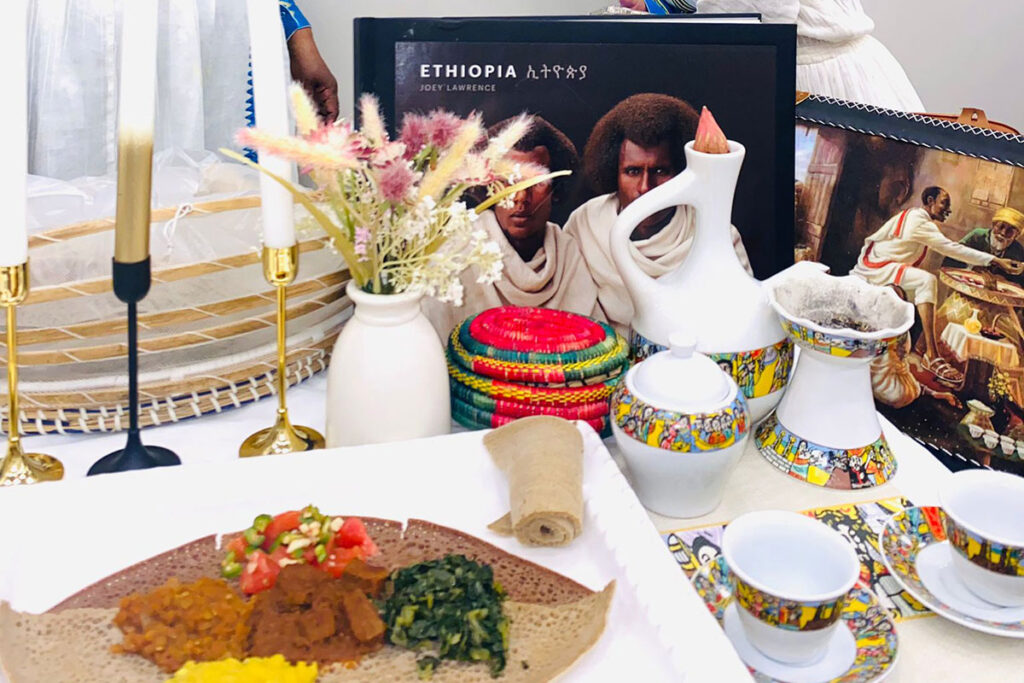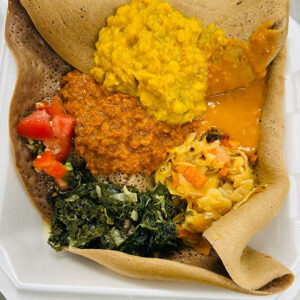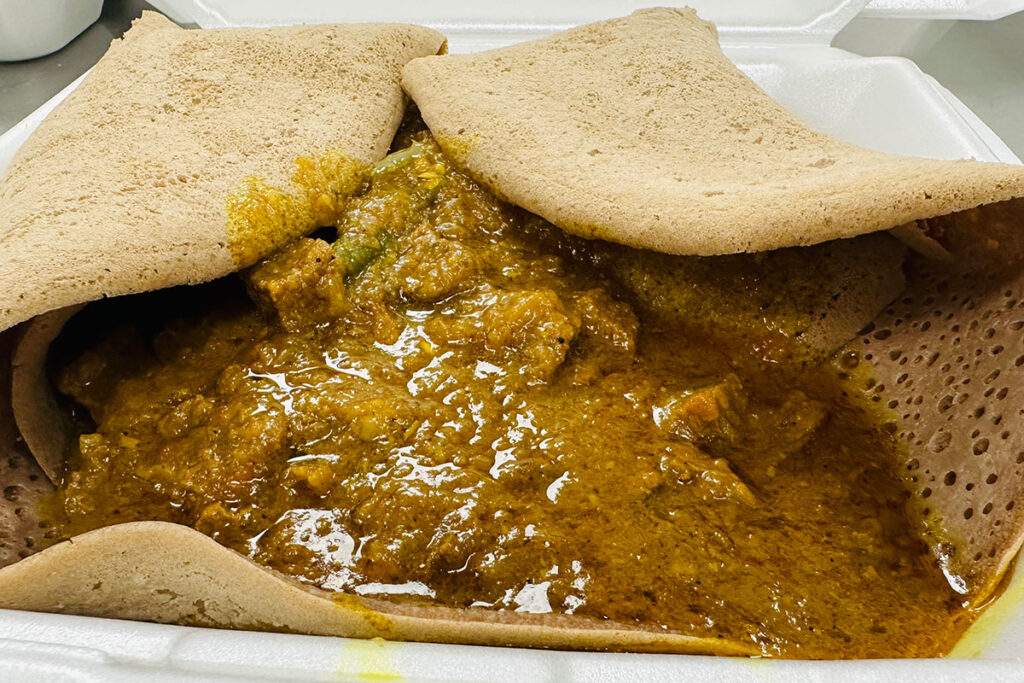The idea of community never seemed so dear until isolation was at the front of our minds in the disconnected depths of the pandemic. Within confinement, in my moments of hunger, I dreamed of gatherings, planning dinner parties in my mind — longing to break bread in rooms filled with laughter and commotion.
Yearning for a seat at the table where food might fall accidentally from serving spoons, staining the tablecloths with random spots that, later, would refuse to come out in the wash, serving as reminders of lifelong memories. Feasts with debates, jokes, and, above all else, unity. We craved company.
At Mahi’s Ethiopian Kitchen, a pop-up in Columbia, the sense of togetherness is a guiding principle. Sharing a plate is encouraged among guests. The energy and values behind the food quenches the parched thirst for companionship even before tasting the first bite of beets and potatoes. Eating communally here is eating with compassion. Share the flavors and share about your day. Pass the plate to the person next to you.

Welcome
Mahalet Tesfaye is the host and owner of Mahi’s Ethiopian Kitchen. She was born in Ethiopia. When she was young, her parents moved to Kenya as refugees and lived there for around twenty years. The family immigrated to San Jose, California by 2011. Columbia, Missouri became a peak interest after her mother attended a friend’s wedding in the area and decided to move to the Midwest town. And five years ago, Tesfaye followed suit, moving to Columbia to be close to family. When she arrived, Tesfaye discovered a dearth of Ethiopian food service options, prompting her to share her own.
Tesfaye is no stranger to the kitchen. Her mother, Amelework Agide, ran an Ethiopian restaurant in Kenya; Tesfaye grew up with it. She was, as she puts it, “free labor, in a good way.” She occupied a variety of roles, from prep cook to dishwasher, or simply as a stand-in for those who couldn’t make it to work on a particular day. Around the clock, after school, or on break, she seemed to happily grow up in the restaurant.
“But I never thought I’d do it. I was like, ‘Nah, it’s not for me,’” Tesfaye explains. “I know how much work it is. But then, when I moved here, I would have Friendsgiving or throw a party and make food, and even my non-Ethiopian friends were like, ‘You should open up [a restaurant].’ Even as I moved here, I didn’t have any work history. So [working in a restaurant] was the best way to start. I started taking food orders, and then I became a cook. And I just went up. And then I realized I should do this for myself; like, I’m already doing it. I’ll just run my own place, you know?”
Please Make Yourself at Home
Noticing the feeling her food evoked among friends gave her a reason to set the table. The feeling of making others happy with her recipes, their faces smiling with glee and sautéed eggplant, warmed her, and she wanted to take it a step further.
Before venturing into her business, she began a Facebook page to gauge the demand for her food. And since her first event in early Summer 2023, the pop-ups have attracted solely from word-of-mouth and social media — which has amassed more than 1,000 followers.
From the idea of her pop-up, Tesfaye expresses a sense of fulfillment: “I’m helping people get to know this new, unique food.”
Most of the menu, pardon one meat option, is even vegan, a surprising theme that could never be guessed from the intense flavors. These healthier options are also the most enjoyed and requested, the vegetables take on a whole new identity, becoming so much more than the acquaintance you thought you knew. The options are welcoming and brilliant, inviting you back for more.
Columbia seems to be indulging happily in this spread. Tesfaye has been mentioned as the talk of the town and continues to be a topic in conversations among friends.
From Hand to Mouth
Tesfaye’s business approach reverberates with the values of her mother’s restaurant.
“It’s not just about the food. It’s about what our family is all about,” she explains. “Having a connection with the customers and getting to know them. And the recipes, of course, have helped a lot.”
Tesfaye’s mother assists heavily in the business, as both a helping hand and an inspiration.
“I was always around her and running her place,” Tesfaye says, adding that she will always admire and support her mother.
“I remember the first time she was really proud of me was when the dishwashing guy didn’t show up,” Tesfaye says, recalling the childhood memory. She was just five years old. The sink the dishwasher would’ve stationed at was a simple standing tap outdoors, away from the restaurant itself.
Hearing her mother ask for plates, not looking up from her chef duties at hand at that moment, Tesfaye felt a sense of responsibility and went to wash the dishes outside. The air was cold, as was the tap gushing out while it cleaned the plates and drenched her dress. The process continued from noon until around four. The young worker washed the plates, brought them inside, and handed them to her mother, who still didn’t notice who was handing her the clean dishes. The restaurant was crowded and busy, and her mother didn’t look up until the hustle of the lunch-rush calmed.
“By the time we were done, she looks at me, and she goes, ‘What happened to you?’’ Tesfaye remembers. She explained to her mom how the dishwasher never came in, and how she took over the position for the shift. “And she just quit and suddenly just sat down and started crying. She said, ‘You could get pneumonia. You could get sick. Why did you do that?’ From then on, I was called her little helper and just got more excited to help out.”


A colorful and delectable table setting from Mahalet Tesafaye’s first Ethiopian pop up (above) at Christian Fellowship Church features split peas wot (stew), red lentils, shiro, gomen, atikilt wot, cabbage, and carrots.
Ripping Injera
Mahi’s Ethiopian Kitchen may expand soon already. The next step is to prepare financially in hopes of starting up a food truck by summer 2024. There may even be a DoorDash option offered in the meantime. Until then, Mahi’s Ethiopian Kitchen shares company and culture through combos at 14 Business Loop 70 East, open from 5-7 p.m. Monday and Wednesday for pickup.
When visiting, Tesfaye may encourage you to share a plate.
“I think it is a very different perspective for people to share. As the culture in the U.S., I guess you always hear grownups telling kids to share this or that, but then it’s so hard to see sharing stuff as a grownup,” she says. “That always kind of rubs me the wrong way. Like we preach it, but we don’t always show it.”
When you visit Mahi’s Ethiopian Kitchen, take the opportunity to meet those around you. The food is built on communal eating, and it tastes much more decadent in the presence of colleagues. The true experience of Mahalet Tesfaye’s cuisine is in sitting with loved ones or soon-to-be-friends, savoring every moment of conversations as you scoop up every last bit of lentils and red pepper sauce. Confinement simmers away as senses fluently harmonize with delectable discussion, and, perhaps, plans to soon meet again.
ABOUT THE AUTHOR
Lydia Graves is a culinary writer enamored with the food communities in both Columbia, Missouri, and Des Moines, Iowa.
With several years in the food and service industry, Lydia has a knowledgeable, descriptive, and enticing voice backed by wit and energy. She will graduate with a BFA in communications and a BS in business from Stephens College in spring of 2024.
Lydia’s Story Library
Chef Gaby Weir Vera nourishes kids
Deep in the Heart of … Columbia?
Eat, Pray, Belly
More Than Meets the Bowl
Deguster: Hannah’s Online Bakery











